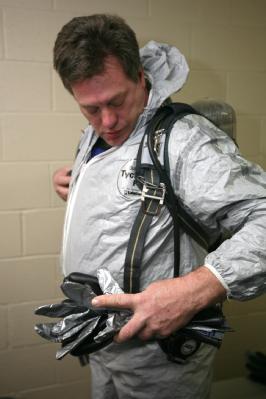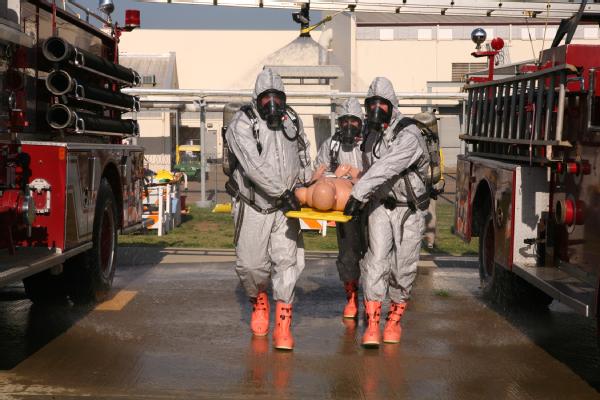Editor’s Note: Mr. Hildreth is the Mayor of Pacific, Wash., a town in Western Washington between Seattle and Tacoma.

Mayor Richard Hildreth of Pacific, Wash., prepares for emergency responder training at the Center for Domestic Preparedness.
I recently completed the Hazard Assessment and Response Management (HARM) course, at FEMA’s Center for Domestic Preparedness (CDP), in Anniston, Alabama, which trains students to conduct a multi-disciplined response to a Chemical, Biological, Radiological, Nuclear, or Explosive incident. As a mayor charged with making key decisions that impact my local response teams during a major incident, advanced, hands-on training makes me an informed member of the emergency management team in my community.
The HARM course is one of a handful I’ve taken at the CDP. Some people may wonder why an elected official would attend training at FEMA’s CDP. I return to the CDP because of the unique training and because there is no other place civilian responders can go to validate their skills in an actual toxic chemical environment.
Specifically, the training helped me understand the challenges a first responder might face, the steps needed to ensure public and responder safety, and the working conditions within which first responders must operate.
But how does my experience at CDP training relate to you?
As Americans, we cannot afford to be caught off guard when a disaster occurs. No matter what your role is in your community, getting prepared for emergencies can ease the initial burden on our first responders immediately following a disaster, allowing them to focus on those that have been most affected.
It is often difficult to take time out of our busy schedules to attend training, or take the simple steps needed to get prepared. In my own experience, it is easy to push disaster preparedness to the back burner and deal with the everyday issues that come with being a local elected official.
However, I encourage you to look into emergency preparedness training opportunities offered in your local community. If you are an emergency responder, visit the CDP Web site to find out more about the specialized, all-hazards training offered.
Both my community and I are better prepared after taking courses like those offered at the CDP. That’s why officials with roles in emergency response and thousands of concerned citizens from around the country participate in training each year. Our communities and businesses are worth it. But more importantly, our citizens are worth it.
- Richard Hildreth

Mayor Richard Hildreth (pictured front-left), of Pacific, Wash., assists his team of emergency responders transport a simulated survivor through the initial stage of decontamination during an exercise.

You are a true roll model Mr. Mayor. Here in central California, Hollister, CA to be exact, I would like to see my mayor and city officials all take a part in this training and any other training that will help our community. Our company recently purchased a radio repeater and donated it to the county for the local CERT program. Now our county has emergency communications that is special for the CERT and local Fire Agents to communicate on a better level without interfering with the real emergency frequency. Needless to say, this caused a new kick in the pants for the 12 CERT members and filled the classroom for this seasons training program.
ReplyDeleteI am sharing your story on my page and blog. www.firsttrustindustries.com and targetingyoursafety.amplify.com
Preparedness is contagious!!
Truly a groundbreaking idea, make leaders understand what really happens in the field. Kudos to Mr. Hildreth for taking the intiative to learn more and gain a functional perspective. So many of the problems in emergency management during a crisis stem from the lack of ability at the management level, not the first responders. You can only learn to make good decisions by understanding the first response roles and responsibilities, no better way to do that than to get your hands dirty. Any leader that believes he/she is too "Executive" to deal with this kind of thing will answer to those who died because of their lack of trainnig and decision making ability. Once again, kudos.
ReplyDelete